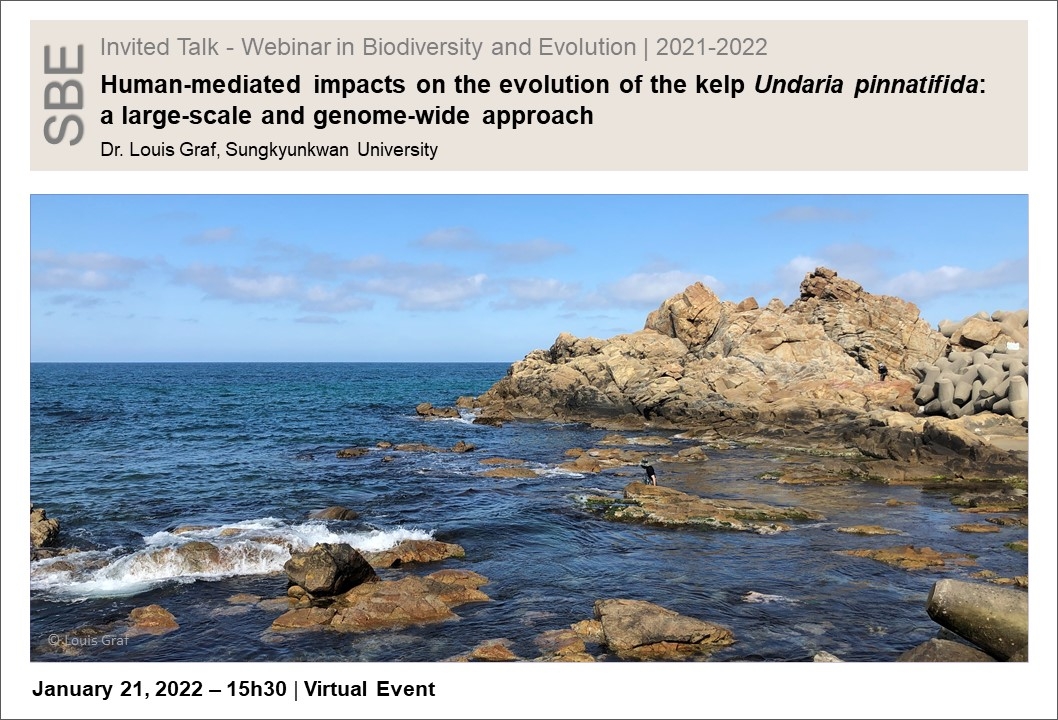Human-mediated impacts on the evolution of the kelp Undaria pinnatifida: a large-scale and genome-wide approach
21 Jan 2022 - Dr. Louis Graf, Sungkyunkwan University | 15h30

INVITED TALK - WEBINAR IN BIODIVERSITY AND EVOLUTION
Human activity is an important driver of ecological and evolutionary change on our planet. In particular, domestication and biological introductions have significant and long-lasting effects on species genomic architecture and diversity. However, only a handful of case studies offer the opportunity to simultaneously address human-driven evolutionary change due to domestication and introduction. The Pacific kelp Undaria pinnatifida (Harvey) Suringar (Laminariales, Phaeophyceae) provides such an opportunity. In its native range of Northeast Asia, this brown edible seaweed has been exploited for centuries, before being extensively cultivated for food consumption, abalone farming and for its extracts. Parallel to cultivation, Undaria pinnatifida has been intentionally and unintentionally transported by humans across the planet and is now reported from the coastlines of 14 countries including France and New Zealand. Therefore, this kelp presents the rare characteristic of being independently cultivated in its native range and introduced in four continents outside of its native range and is now reported from the coastlines of 14 countries including France and New Zealand.
During this talk, I will present the genome sequence of a Korean cultivar of Undaria pinnatifida along with the whole‐genome sequencing of multiple individuals sampled in native, cultivated, and introduced populations. The genome landscape of the different populations’ categories will be discussed. Finally, using the database of variants resulting from this whole-genome sequencing, I developed a SNP microarray to expand the sampling of populations and individuals. This tool offers perspective to extend the genotyping and to develop a new resource for the study of Undaria pinnatifida.
Louis is a seaweed enthusiast, with a primary interest in their ecology and evolution. After completing a Bachelor in Biology and Geology at the Université Paris Diderot (Paris, France) and a Master1 in Evolution and Ecology at the University Paul Sabatier (Toulouse, France), he decided to continue his education abroad. He completed his phD in 2019 at the Sungkyunkwan University (Seoul, Korea) under the supervision of professor Hwan Su Yoon.
His principal investigations have focused on the brown alga Undaria pinnatifida, an alga famous for its cultivation and its worldwide invasion. Using this model, he explores the long-lasting effects of human activities on the species inhabiting our planet. By sequencing the genome of Undaria pinnatifida and the resequencing of 41 individuals sampled from natural, cultivated and introduced populations he revealed how genome architecture may be differentially shaped by contrasting introduction history.
His current work still focuses on Undaria pinnatifida, exploring new dimensions of its genome evolution such as speciation and local adaptation. He is also involved in genomic assisted breeding programs of seaweeds but also taxonomic studies and or exploration of the heterokont algae.
[Host: Cátia Monteiro, Marine Ecology, Diversity and Change - MarChange]